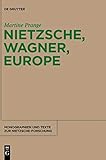Nietzsche, Wagner, Europe / Martine Prange.
Material type: TextSeries: Monographien und Texte zur Nietzsche-Forschung ; 61Publisher: Berlin ; Boston : De Gruyter, [2013]Copyright date: ©2013Description: 1 online resource (286 p.)Content type:
TextSeries: Monographien und Texte zur Nietzsche-Forschung ; 61Publisher: Berlin ; Boston : De Gruyter, [2013]Copyright date: ©2013Description: 1 online resource (286 p.)Content type: - 9783110315097
- 9783110315233
- ML423.N56 P73 2013
- online - DeGruyter
- Issued also in print.
| Item type | Current library | Call number | URL | Status | Notes | Barcode | |
|---|---|---|---|---|---|---|---|
 eBook
eBook
|
Biblioteca "Angelicum" Pont. Univ. S.Tommaso d'Aquino Nuvola online | online - DeGruyter (Browse shelf(Opens below)) | Online access | Not for loan (Accesso limitato) | Accesso per gli utenti autorizzati / Access for authorized users | (dgr)9783110315233 |
Frontmatter -- Abbreviations and translations -- Contents -- General introduction -- Part I Aestheticization: Germany as saviour of Europe -- Chapter 1 Was Nietzsche ever a true Wagnerian? -- Chapter 2 Germanizing music and culture: Richard Wagner’s ‘Beethoven’ essay -- Chapter 3 Nietzsche’s reception of Wagner’s ‘Beethoven’ essay in the spirit of Weimar Classicism -- Chapter 4 The Birth of Tragedy out of Nietzsche’s concern for Wagner’s ‘Graecization’ -- Part II Dynamic interculturalism: De-Germanization and the ‘Good European’ -- Chapter 5 Nietzsche’s anti-Wagnerism in the light of his increasing cosmopolitanism -- Chapter 6 ‘La Gaya Scienza’ in music: Nietzsche’s new musical aesthetics -- Chapter 7 Goethe as model of the ‘Good European’ -- Epilogue -- Bibliography -- Index
restricted access online access with authorization star
http://purl.org/coar/access_right/c_16ec
Friedrich Nietzsche (1844-1900) supported the unification of Europe and reflected on this like few other philosophers before or after him. Many of his works are concerned with the present state and future of European culture and humanity. Resisting the “nationalist nonsense” and “politics of dissolution” of his day, he advocated the birth of “good Europeans,” i.e. “supra-national” individuals and the “amalgamation of nations.”Nietzsche, Wagner, Europe analyzes the development of Friedrich Nietzsche’s ideal of European culture based on his musical aesthetics. It does so against the background of contemporary searches for a wider, cultural meaning beyond Europe’s economic-political union. The book claims that Nietzsche always propagated the “aestheticization” of Europe, but that his view on how to achieve this changed as a result of his dramatically altering philosophy of music. The main focus is on Nietzsche’s passion for and later aversion to Wagner’s music, and, in direct connection with this, his surprising embrace of Italian operas as new forms of “Dionysian” music and of Goethe as a model of “Good Europeanism.”
Issued also in print.
Mode of access: Internet via World Wide Web.
In English.
Description based on online resource; title from PDF title page (publisher's Web site, viewed 28. Feb 2023)


